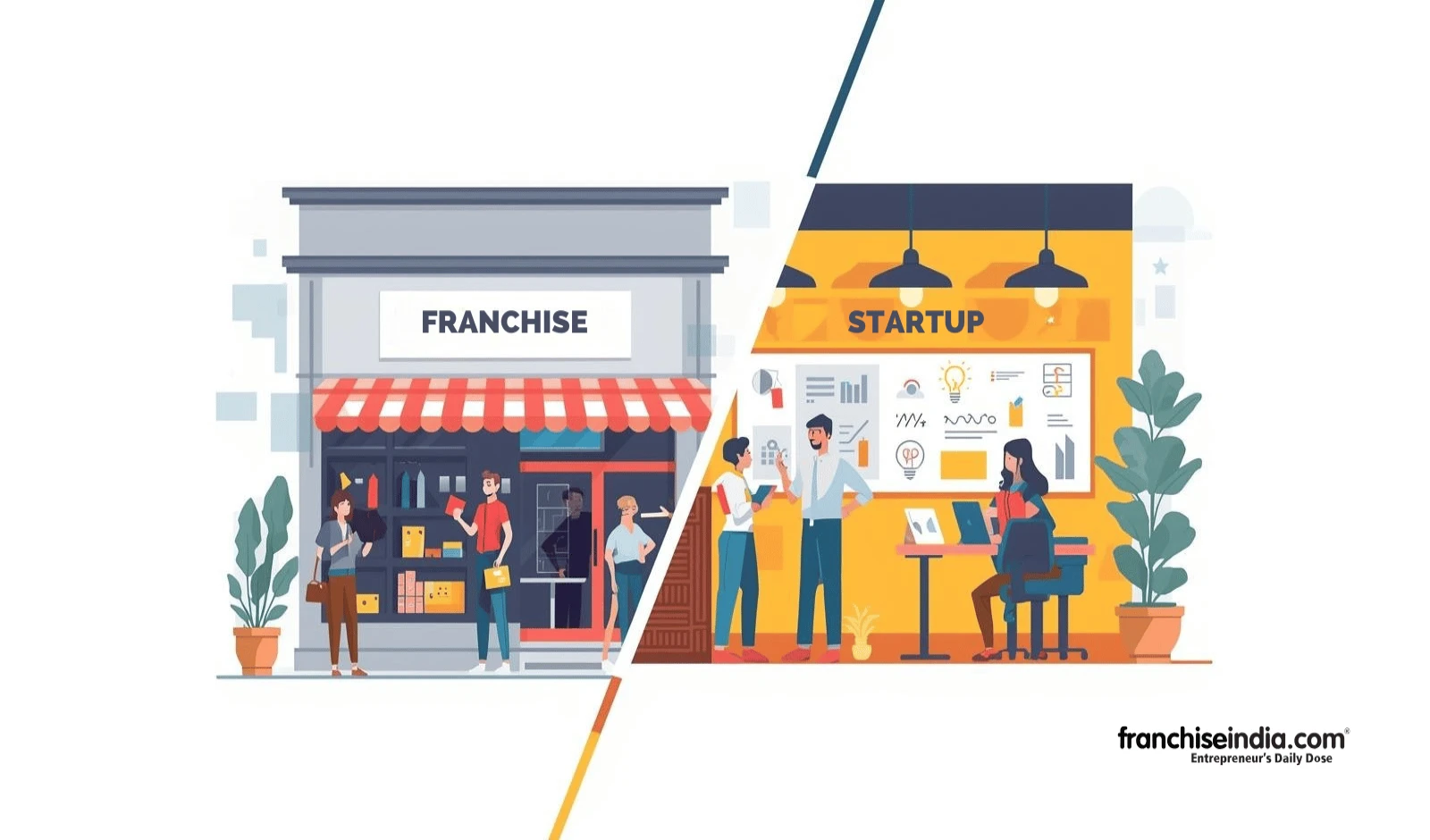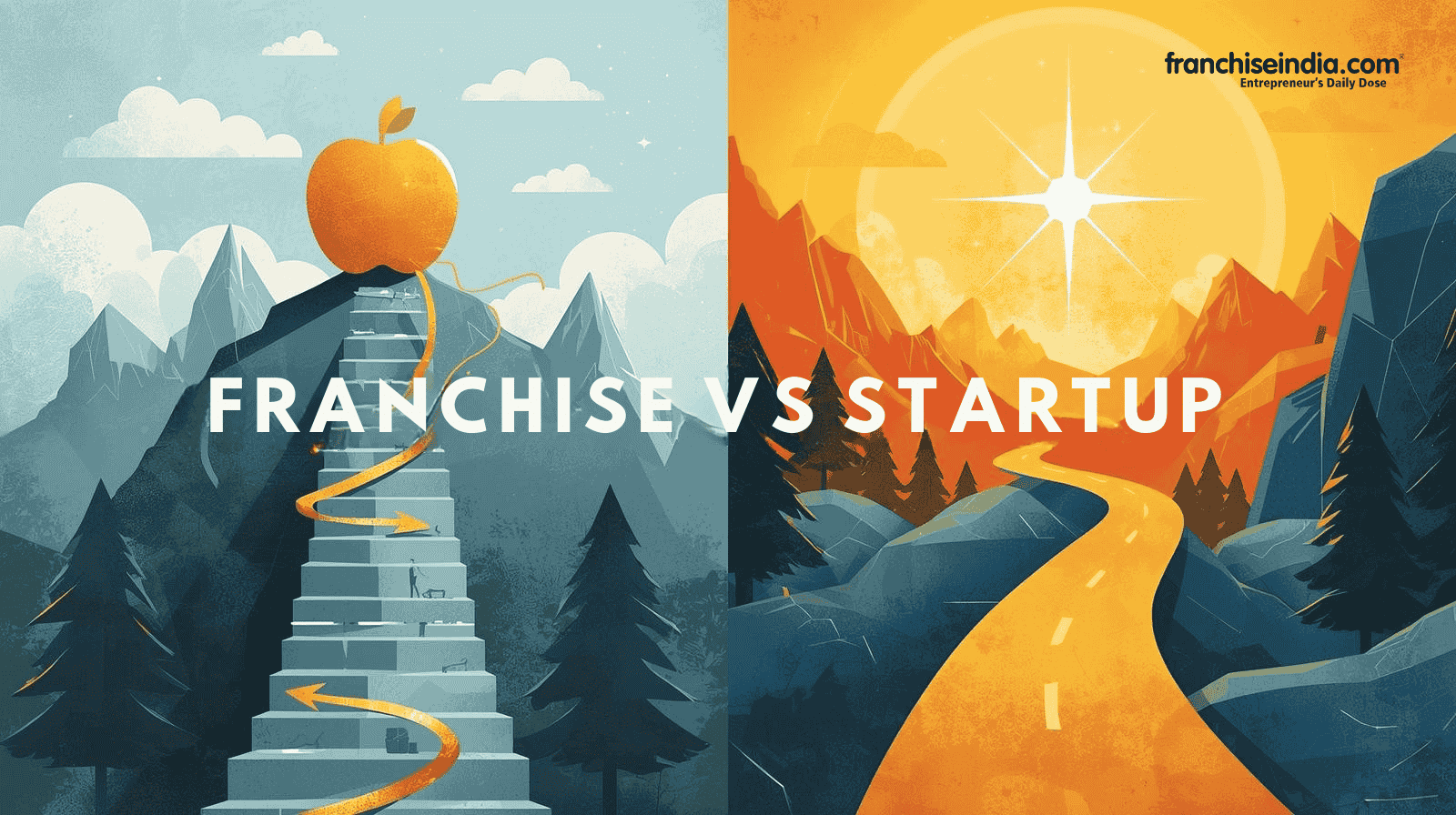
Are you confused about whether to start from scratch or invest in some well-reputed branded franchise? Then don’t worry; we got you covered. We will let you know everything from which to choose and how much you need to invest to how to manage it and make it a profitable long-term business. Owning a well-known brand could have less risk, but it comes with a certain amount of control as well, while on the other hand, starting your own business comes with more risk but high rewards. Read this till the end to see your great fit.
Overview
A franchise is like a blueprint for success. In franchising, it generally means that you have to pay a certain amount, or you can pay a fee to operate a well-established brand and use its trademark, business model, and policies. It's like you will get a “business in a box”, which means you don't have to build any brand. It all comes prepacked and ready to go.
Meanwhile, a startup is a business that you build from scratch. This means you are responsible for everything related to it. From the idea and securing the initial funds to developing a product, finding your first customers, and building it into a brand. You have to do everything. It is like you are the builder as well as the designer of your brand; it's a journey of innovation and creating a brand with a higher risk.
Also read: Read this before investing in Reliance Fresh franchise
Risk and Reward: A Clear Analysis
.png)
The main difference between a startup and a franchise is the amount of risk and success rate they both carry. The pictures drawn from their stats are pretty clear.
Franchise
- The success rate of a franchise is generally greater. According to the study, a large percentage of franchises continue to operate even after more than 5 years, which is a lot greater than the independent businesses.
- The franchisor has a well-established business plan, extensive support, brand recognition, and a clear-cut business model, which helps in succeeding.
- They follow a successful formula, which most startup owners do not have.
- Franchising helps to avoid a lot of typical blunders because of the model and guidance you get.
Startups
- Startups have much higher risk and are more likely to fail. Around 50% of new businesses do not even survive their first year, and around 25% do not make it through the next 5 years.
- The reasons typically involve common reasons, which are an unproven business idea, a shortage of capital, and competition.
- Those who succeed have limitless potential benefits and unlimited rewards.
- Successful startups can give a much higher return on investment and can grow exponentially compared to a franchise if operated well.
To put it simply, a startup offers a higher-risk, higher-reward scenario, but a franchise gives a safer, more predictable return on investment.
Also read: Top 10 Car Detailing Franchises in India
The Price of Entry: Cost and Revenue in Startup and Franchises
Franchise fees vary from brand to brand. Both of these businesses have basically different financial models.
Franchise
- In a franchise, initially you need to pay a large amount of funds. This includes a one-time franchise fee to get the brand's rights.
- In addition, there is the cost of initial inventory equipment and store build-out. All this can add up to tens of thousands or even millions of dollars for high-end, top-notch brands.
- Franchises also have to continue to pay ongoing royalties, which means a percentage of their total sale. While these fees cut into your profits, they also pay for the support and the brand power you received.
Startup
- A business can sometimes start with much lower investment, particularly in service-based or digital industries.
- You jump-start using your own funds and can progressively scale it. However, this strategy comes with a big financial risk, as you have to pay for everything on your own, from the start to the end.
- Includes creating a product to develop it, marketing, etc. You have to build your own brand from scratch, without a guaranteed assurance that you will turn a profit.
- Since it is your own business and there are no royalties or payments to a parent firm, all the money that you made is yours to keep.
As a result, you will have more control over your profit margins.
Also read: 15 Ways to Raise Funds for Startups in India
How Control Shapes the Startup and Franchise
The difference between the two models is the degree of control you have over your company.
Franchise
- Franchises offer you little and limited creative control. You have to follow the operating rules and guidelines set by the franchisor.
- This includes everything from the layout of your store, marketing, material, staff uniform, to store design, approved supplies, etc.
- Customers expect uniformity across all the franchise sites.
- While this lack of autonomy can be frustrating for a hands-on entrepreneur, it also releases the burden of having to make every decision on your own.
Startup
- As a startup founder, you have total control of your company.
- You have complete control over all your decisions, including what to name your company and its logo, products and services you will sell or offer and the business plan you will follow.
- This flexibility promotes innovation and the ability to adapt swiftly to market needs and demands.

Marketing and Recognition
In today's competitive market, one of the most difficult aspects of starting a new business is building a brand from scratch and gaining loyal customers.
Franchise
- A key benefit of investing in a franchise is that you will get immediate brand recognition.
- The built-in brand already has loyal customers and has gained their trust over the years. You don't have to spend years promoting it, trying to make it a brand and recognised by people.
- Your brand already has your successful operation and national marketing constraints.
- This significantly and drastically lowers your marketing expense and makes it much easier to attract customers.
Startup
- Building a brand is a challenging, difficult and ongoing process for your startup.
- As an unknown entity, you have to put in a lot of effort to gain the trust of your customers and work tirelessly.
- Developing credibility and creating awareness will be a crucial aspect of your marketing initiative. You will need to develop your own unique brand marketing collateral and strategies without any support from a large corporate team.
The bottom line is a franchise provides a great kickstart; on the other hand, a startup requests to do all this from scratch on its own.
Also read: Startup India: Nearly 1.16 Lakh Entities Get Recognition In 8 Years
Exit Strategies and Long-Term Goals
It is as vital to consider how to exit the firm as it is to consider how to create the firm. Whatever path you choose will greatly impact your options.
Franchise
- Franchising provides a well-defined exit strategy.
- If any new franchise is willing to invest, you can sell your company to them. In some cases a franchise may even have a buyback programme.
- Your company's worth is frequently determined by its profitability and status as a part of a large, established, more reputable brand, which can make it easier to find a buyer.
Startup
- A startup's exit strategy is much more complex and unpredictable.
- This could range from a highly profitable acquisition by a bigger company, or it could be a lengthy wind-down if the business doesn't take off as the startup.
- The value of your business entirely depends on its performance, intellectual property and marketing potential, which makes your form a considerably riskier and less predictable asset.
Conclusion
Choosing between a franchise and a startup is not about finding the "better" option but about finding the right option for you.
- If you are a cautious individual who values a structured, tested model and strong support system, then investing in a franchise would be a more reliable path for you. In this you will sacrifice some creative control and will pay recurring fees, but you will gain a higher success rate and a more straightforward path to profitability.
- If you are a visionary who lives on creativity, freedom and innovation and is prepared to take a higher risk in exchange for possible limitless returns, then opening a startup is a great fit for you. In this process you will face greater challenges and higher chances of failure, but this journey of building and learning something of your own can be incredibly rewarding.
In the end your decision should align with your long-term objective personality and financial capacity. You just need to choose which part is more appropriate for you to take; both parts lead to the existing world of business ownership.
You might also like to know: Impact of Economic Downturns on Startup Financing: Lessons from Past and Strategies for Future

